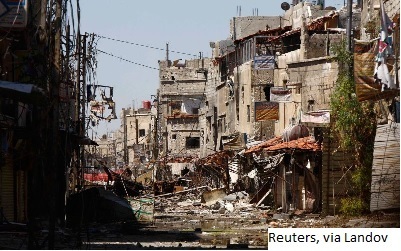Recap – Mid-East, Where Are We?In a media frenzy dependent on...

Recap – Mid-East, Where Are We?
In a media frenzy dependent on “what’s happening today,” sometimes the overview is lost. So, depressing as this is, you need context to know where we are in all the mess percolating in the Mid-East to understand the evening news or NY Times.
All evaluation points to the fact that the situation on the ground in Syria has dramatically worsened. The country is now in the fifth year with fighting escalating and attacks being targeted on civilians being ramped up. UN Under-Secretary-General for Humanitarian Affairs Valerie Amos told the Security Council, “Civilians continue to bear the brunt of this conflict…. The inability of… countries with influence over the different parties at war in Syria to agree on the elements for a political solution in the country means that the humanitarian consequences will continue to be dire for millions of Syrians.” The conflict has already claimed more than 220,000 lives. Meanwhile, more than 12.2 million people continue to require life-saving aid. The fighting has also provoked massive displacement with more than 4 million people having sought refuge in neighboring countries, while a further 7.6 million are displaced within Syria. Ms. Amos observed that children were “particularly badly affected” by the hostilities with 5.6 million children now in need of assistance and well over 2 million children out of school.
Our US Civil War killed a little over 130,000 – so imagine how long Syria and the region will take to get over their “little internal war” (as one Congressman referred to it).
Meanwhile Saudi Arabia has begun military operations in the Gulf nation of Yemen and the UN Secretary-General’s Special Adviser on Yemen, Jamal Benomar, warned that the country is on a “rapid downward spiral” as the conflict has taken on “worrying sectarian tones and deepening north-south divisions.”
And let’s turn to the constant issue in the region – Israel and Palestine. Those parties do not appear ready to recommence talks. Robert Serry, serving as the UN Secretary-General’s Special Representative to the Middle East for the last 7 years (so he knows a thing or two), “I cannot but express an overriding feeling that I have been part of a peace process in which a can is kicked down an endless road.” And then he added a warning as he is leaving his post, “Losing sight of reaching peace between Israel, Palestine and the wider Arab world altogether – and I have repeatedly warned that we may be heading in this direction – would be tantamount to pouring more oil on the regional flames.”
When he congratulated Prime Minister Netanyahu on his re-election, he did sound a word of caution over Bibi’s hard line comments regarding no two nation peace talks which, of course, sparked a worrying decision by the Palestine Liberation Organization (PLO) to suspend all forms of security coordination given Israel’s systematic and ongoing noncompliance with its obligations under signed agreements. Serry, “We cannot run from reality. There is a genuine possibility that ending Palestinian security coordination with Israel may be the final nail in the coffin of the Oslo Accords. However, Israel’s withholding of Palestinian tax revenues for the third month, now amounting to over $400 million dollars, is deepening the financial crisis.”
Okay, that’s perhaps enough depressing news, but you should know this: Nigeria, the Congo, and other African countries are in similar (continuing) turmoil. It just doesn’t make your evening news. Worldwide, there are 42.9 million refugees or displaced persons and 125 million people needing aid in war-torn areas – and if that many people are being adversely affected because of war, you are looking at numbers approaching the disasters of WWII.



